Richard Blanco | |
|---|---|
 | |
| Born | 27 December 1964 |
| Political party | Fearless People's Alliance |
Richard Blanco (27 December 1964) is a Venezuelan politician, current deputy of the National Assembly and president of the Fearless People's Alliance party.
Richard Blanco | |
|---|---|
 | |
| Born | 27 December 1964 |
| Political party | Fearless People's Alliance |
Richard Blanco (27 December 1964) is a Venezuelan politician, current deputy of the National Assembly and president of the Fearless People's Alliance party.
Richard Blanco graduated with a degree in social communication from Cecilio Acosta Catholic University and studied law at the Universidad Santa María. He has been the president of the Fearless People's Alliance party and a columnist for the newspaper El Nacional. He was general coordinator of the prefecture of the former governor's office of the Capital District in 1992, general director of municipal cemeteries between 1996 and 1999, director of citizen management of the mayor's office of Caracas between 1999 and 2001 and prefect of Caracas under the municipal administration of Antonio Ledezma between 2008 and 2009. [1]
Richard was arrested in Caracas in August 2009 on charges of inciting violence and injuring a police officer during a demonstration. Amnesty International stated that "his detention appeared to be politically motivated", stating that the video evidence offered to prove his charges did not show any evidence of violence or incitement by Blanco. The organization called for his release. [2] He was released on bail in April 2010. [3] He was a member of the National Assembly for the 2011–201 term. [1] He was afterwards re-elected for the period 2016–2021. He was president of the Permanent Commission of Cults and Penitentiary Regime of the National Assembly of Venezuela in 2016 and 2017.[ citation needed ]
In 2018 he was appointed head of fraction of the Soy Venezuela alliance in the National Assembly (16 de Julio faction) until 2019, when he is succeeded by Convergencia militant, Biagio Pilieri.[ citation needed ]

The politics of Venezuela occurs in a framework explained in Government of Venezuela.
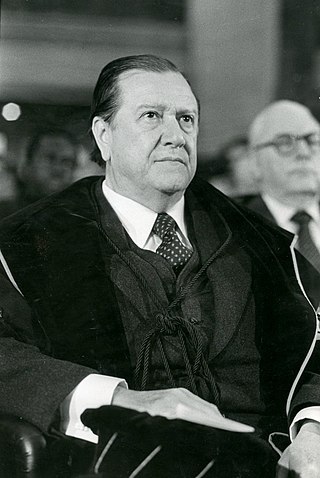
Rafael Antonio Caldera Rodríguez, twice elected the president of Venezuela, served for two five-year terms, becoming the longest serving democratically elected leader to govern the country in the twentieth century. His first term marked the first peaceful transfer of power to the opposition in Venezuela's history.

Antonio Leocadio Guzmán Blanco was a Venezuelan military leader, statesman, diplomat and politician. He was the president of Venezuela for three separate terms, from 1870 until 1877, from 1879 until 1884, and from 1886 until 1887 and General during the Venezuelan Federal War.

Carlos Andrés Pérez Rodríguez also known as CAP and often referred to as El Gocho, was a Venezuelan politician and the president of Venezuela from 12 March 1974 to 12 March 1979 and again from 2 February 1989 to 21 May 1993. He was one of the founders of Acción Democrática, the dominant political party in Venezuela during the second half of the twentieth century.

Elections in Venezuela are held at a national level for the President of Venezuela as head of state and head of government, and for a unicameral legislature. The President of Venezuela is elected for a six-year term by direct election plurality voting, and is eligible for re-election. The National Assembly (Asamblea Nacional) has 165 members (diputados), elected for five-year terms using a mixed-member majoritarian representation system. Elections also take place at state level and local level.

The Constitution of the Bolivarian Republic of Venezuela is the current and twenty-sixth constitution of Venezuela. It was drafted in mid-1999 by a constituent assembly that had been created by popular referendum. Adopted in December 1999, it replaced the 1961 Constitution, the longest-serving in Venezuelan history. It was primarily promoted by then President of Venezuela Hugo Chávez and thereafter received strong backing from diverse sectors, including figures involved in promulgating the 1961 constitution such as Luis Miquilena and Carlos Andrés Pérez. Chávez and his followers (chavistas) refer to the 1999 document as the "Constitución Bolivariana" because they assert that it is ideologically descended from the thinking and political philosophy of Simón Bolívar and Bolivarianism. Since the creation of the Constituent National Assembly in August 2017, the Bolivarian government has declared the 1999 constitution suspended until a new constitution is created.

The Caracazo is the name given to the wave of protests, riots and looting that started on 27 February 1989 in the Venezuelan city of Guarenas, spreading to Caracas and surrounding towns following policy reversals from President Carlos Andrés Pérez. The weeklong clashes resulted in the deaths of hundreds to thousands of people, mostly at the hands of security forces and the military. Protests began mainly in response to the government's acceptance of neoliberal economic reforms promoted by the International Monetary Fund, the institution of austerity policies and the resulting increase in the price of gasoline and transportation.

Guillermo Tell Villegas was a Venezuelan politician, lawyer, and writer. Among other government positions, he served as interim president of Venezuela in 1868, 1870 and 1892. Starting his career in law, he became governor of Barinas in 1859 and afterwards held various roles in the government of Juan Crisostomo Falcon, including deputy in the Assembly of Victory, Minister of Interior and Justice, and interim Foreign Minister of Venezuela. In 1864 and in 1866 was appointed to the Federal High Court. Villegas participated in the La Genuina revolution in 1867, and was elected president of the Chamber of Deputies in 1868, where he openly opposed the government of Falcón. The Blue Revolution in 1868 removed Falcon from power, and Villegas became Foreign Minister under President José Ruperto Monagas. In 1868 Villegas spent eight months as interim president of Venezuela, during which time he reinstated the Federal Constitution from 1864. After again serving as interim president and Minister of the Interior in 1869, in 1870 he was interim president a third time while Monagas fought the Liberal Revolution. The revolution was successful, and Villegas retired from active politics after ceding the presidency.
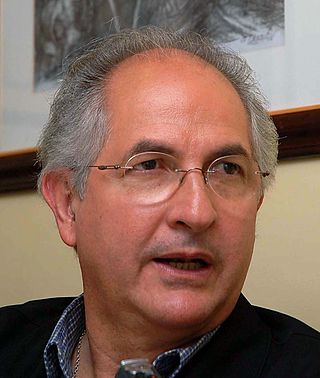
The Fearless People's Alliance is a political party in Venezuela. At the 2000 Venezuelan parliamentary election the party won one out of 165 seats in the National Assembly of Venezuela.
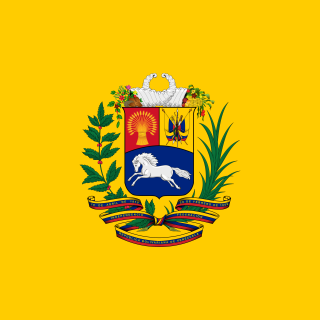
The president of Venezuela, officially known as the President of the Bolivarian Republic of Venezuela, is the head of state and head of government in Venezuela. The president leads the National Executive of the Venezuelan government and is the commander-in-chief of the National Bolivarian Armed Forces. Presidential terms were set at six years with the adoption of the 1999 Constitution of Venezuela, and presidential term limits were removed in 2009.
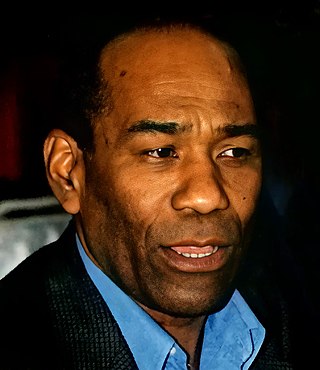
Aristóbulo Istúriz Almeida was a Venezuelan politician and academic. He was vice president of the Constituent Assembly of Venezuela as well as vice president of Venezuela.

Leopoldo Eduardo López Mendoza is a Venezuelan opposition leader. He co-founded the political party Primero Justicia in 2000 with Julio Borges. López was elected mayor of the Chacao Municipality of Caracas in the regional elections held in July 2000. He is the National Coordinator of another political party, Voluntad Popular, which he founded in 2009.
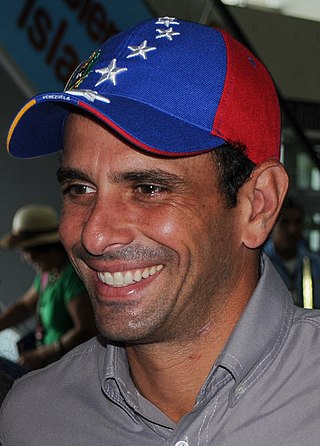
Henrique Capriles Radonski is a Venezuelan politician and lawyer, who served as the 36th Governor of Miranda from 2008 to 2017.

Antonio José Ledezma Díaz is a Venezuelan lawyer, opposition politician and former political prisoner. After unsuccessfully challenging for the leadership of Democratic Action in 1999, he founded a new party, the Fearless People's Alliance.

The record of human rights in Venezuela has been criticized by human rights organizations such as Human Rights Watch and Amnesty International. Concerns include attacks against journalists, political persecution, harassment of human rights defenders, poor prison conditions, torture, extrajudicial executions by death squads, and forced disappearances.
Popular Will is a political party in Venezuela founded by former Mayor of Chacao, Leopoldo López, who is its national co-ordinator. The party previously held 14 out of 167 seats in the Venezuelan National Assembly, the country's parliament, and is a member of the Democratic Unity Roundtable, the electoral coalition that held a plurality in the National Assembly between 2015 and 2020. The party describes itself as progressive and social-democratic, and was admitted into the Socialist International in December 2014.The party was formed in reaction to complaints of infringements of individual freedom and human rights on the part of the government of the Venezuelan president Hugo Chávez and his successor, Nicolás Maduro. The party attempts to bring together Venezuelans of various backgrounds who consider Chavismo oppressive and authoritarian. Popular Will self-identifies itself as "a pluralist and democratic movement" that is committed to "progress", which it defines as the realization of "the social, economic, political, and human rights of every Venezuelan." The party says its "fundamental pillars" are progress, democracy, and social action.

Colectivos are far-left Venezuelan armed paramilitary groups that support the Bolivarian government, the Great Patriotic Pole (GPP) political alliance and Venezuela's ruling party, the United Socialist Party of Venezuela (PSUV). Colectivo has become an umbrella term for irregular armed groups that operate in poverty-stricken areas.

Parliamentary elections were held in Venezuela on 6 December 2015 to elect the 164 deputies and three indigenous representatives of the National Assembly. They were the fourth parliamentary elections to take place after the 1999 constitution, which abolished the bicameral system in favour of a unicameral parliament, and the first to take place after the death of President Hugo Chávez. Despite predictions from the opposition of a possible last-minute cancellation, the elections took place as scheduled, with the majority of polls showing the Democratic Unity Roundtable (MUD) holding a wide lead over the ruling United Socialist Party of Venezuela (PSUV) and its wider alliance, the Great Patriotic Pole (GPP).

2016 protests in Venezuela began in early January following controversy surrounding the 2015 Venezuelan parliamentary elections and the increasing hardships felt by Venezuelans. The series of protests originally began in February 2014 when hundreds of thousands of Venezuelans protested due to high levels of criminal violence, inflation, and chronic scarcity of basic goods because of policies created by the Venezuelan government though the size of protests had decreased since 2014.
Con El Mazo Dando is a Venezuelan television programme. It is transmitted every Wednesdays at 7pm on Venezolana de Televisión and TVes. It is hosted by Diosdado Cabello. Its sister broadcast Nos Vemos en la Radio is also broadcast on Radio Nacional de Venezuela.